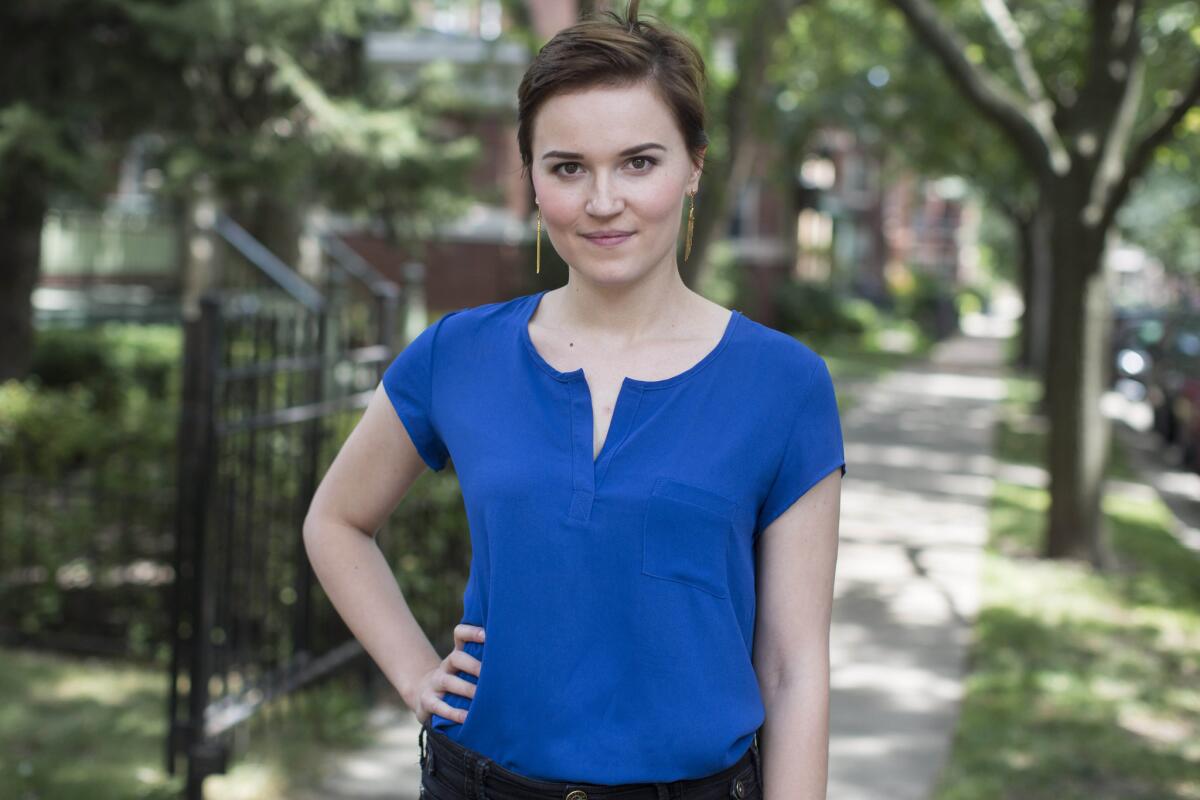Veronica Roth’s ‘Allegiant’ builds up its heroine for revolution

Veronica Roth’s “Divergent” trilogy, now entering its final chapter, occupies the cultural space previously held by Suzanne Collins’ “The Hunger Games”: wildly popular dystopic young adult trilogy starring a battle-scarred heroine, soon to be a major motion picture in a theater near you. Roth’s previous two novels have sold more than 4 million copies and the third, “Allegiant,” was so hotly anticipated that my advance copy had my name printed in 72-point type across every single page so it couldn’t be sold on eBay.
Roth’s intellectual contribution to the literature of dystopia breaks down to a few choice bits: a narrative framework to debate nature vs. nurture, the relative merits of specialization vs. the good old well-rounded student, and yet another kick-ass heroine whose exuberant embrace of life during wartime could either subvert the genre by way of gender, or just put a modern gloss on the same old stories of mercenaries and mayhem.
The first book, “Divergent,” sets up the world and the conflict: In some not-so-distant future, all of humanity (the part of it living in Chicago anyway) has been divided into five factions, each representing a different set of values and skills. Children are reared in the faction of their parents, but at age 16 are presented with a high-stakes version of a classic teenage dilemma: Stay in the world they have always known, or venture out into the unknown and leave everyone — including their families — behind.
This is not like flirting with big-city colleges or Buddhism, though: Teenage rebels will be stuck with their choice for life, no matter what regrets middle age (or early 20s) bring.
Naturally, Roth’s heroine follows the path of greatest complexity. Raised in Abnegation (a faction known for shapeless gray clothing, bland food, rejection of vanity and public affection), Beatrice discovers she is freakishly well-suited for three different factions — Abnegation, Erudite (the intellectuals) and Dauntless (the warriors) — a superpower known as divergence that makes her so dangerous that, she is told, she could be killed at any time.
Leaving her sweet parents behind, Beatrice exchanges her classic name for the vaguely sci-fi sounding Tris and joins the pierced and tattooed mercenaries known as Dauntless who practice extreme hazing rituals in a dystopic dorm room: Romantic triangles end with one party at the bottom of a perilous pit. Schoolgirls fall out when one bestie shoots and kills the other’s boyfriend (but he was under a mind control serum!)
Tris surprises everyone by rising to the top of her class. Her divergence — psychologists might label it “multiple intelligences” — allows her a mental strength to overcome her fears in the simulation exercises used for training. And in a peculiarly feminine — feminist? — twist she discovers that her unusually small size can be used to her advantage. An exchange between Tris and Lynn, a pretty Dauntless girl, could illustrate decades of feminist argument: Lynn shaves her head because she believes if she looks more like a boy she will be more intimidating; Tris believes it’s more “cunning” to use “being underestimated to your advantage.”
The Dauntless dormitory is essentially a fictional version of an integrated military and in this world, the laws of attraction dictate that chivalry is well, dead. Tris finds herself choosing between a gentle and kind classmate who cries himself to sleep and a handsome instructor named Four who demonstrates his respect for her strength by, say, hurling knives at her head during a classroom exercise.
“He is not sweet or gentle or particularly kind,” says Tris of Four, “But he is smart and brave and treated me like I was strong.” Spoiler: She goes with the knife-thrower.
Thusly paired, Tris and Four become the romantic power-couple of the mercenary class — and just in time, because revolution, the subject of book two, “Insurgence,” is just around the corner. While “Twilight” made a virginity fetish out of romantic longing, every time these two get close to consummation, they are interrupted by a bomb or a would-be assassin, or separated by yet another secret rescue mission.
As in fairy tales, the best parents are dead ones and Tris’ parents, being beloved, aren’t long for this world. But Four’s parents, being loathed, stick around long enough to provide both with a particularly delicious nemeses throughout book two. (Four battles his once-abusive father; Tris’ female villain is an archetype every bit as classic as the evil stepmother — the woman who would be her mother-in-law, if only she and Four could get it together long enough to consummate and/or sanctify their love).
The final volume, “Allegiant,” finally brings the characters outside the gated community of Chicago into the larger world of Coca-Cola, energy drinks and the TSA. Here there are no factions, just two groups: the “genetically pure” and the “genetically damaged.” Both groups are “technically, legally equal,” but only GPs can be scientists and researchers. The GDs, we are told, are totally cool with playing the support staff because everyone gets that’s just the way things are. Well, until they are not.
The biggest shift is that the new book alternates between using Tris and Four as narrator. In part, this device allows the novel to cover more space and time and gives us an outside view of Tris from her boyfriend’s perspective (hint: he thinks she’s sexy as “a warrior not a girl”).
It also allows for a surprise ending that is gutsier and much less predictable than the rest of the series would lead one to expect.
By this time, certain readers may feel they’ve spent more time counting bodies than getting to know actual people. But those who appreciate the equivalent of a blockbuster action flick conveniently packaged within a little under 1,500 pages will find much here to love. And if you just want to skip to the big-screen version, starring Shailene Woodley, Kate Winslet and Theo James, it’s already shooting now.
Allegiant
Veronica Roth
Katherine Tegen Books: 544 pp., $19.99
More to Read
Sign up for our Book Club newsletter
Get the latest news, events and more from the Los Angeles Times Book Club, and help us get L.A. reading and talking.
You may occasionally receive promotional content from the Los Angeles Times.








